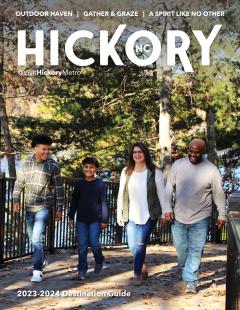Make It Your Nature to Protect North Carolina’s Outdoor Spaces
When you follow the 7 principles of Leave No Trace and proper COVID-19 safety recommendations, you can connect with nature like never before. In Hickory, Catawba County and the Metro region we welcome you to explore our outdoor spaces, while making it your nature to protect these spaces.
#OutdoorNC #MakeItYourNature #HKYCleanUp
PRINCIPLE NO. 1
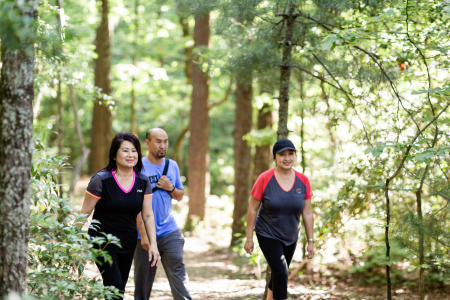 PLAN AHEAD AND PREPARE
PLAN AHEAD AND PREPARE
- North Carolina is home to endless opportunities for outdoor recreation. Before you travel, learn about your destination, its regulations and safety matters.
- To reduce your impact, choose lesser-known areas and times of high use.
- Have a backup plan in case your chosen destination is crowded or parking areas are full.
- Pack food, water and the right clothes to protect you from the elements.
PRINCIPLE NO. 2
STICK TO TRAILS AND OVERNIGHT RIGHT
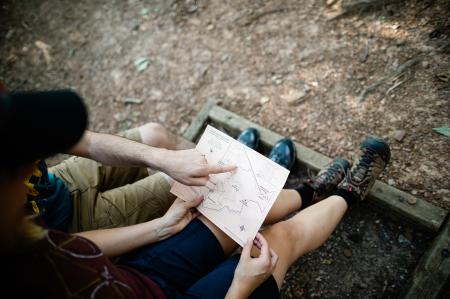 Keep to designated trails and durable surfaces to protect trailside plants. Camp at existing or designated sites.
Keep to designated trails and durable surfaces to protect trailside plants. Camp at existing or designated sites.- In the backcountry, confine your impact to places that already show use, and limit the area of disturbance.
- Take rest breaks on durable surfaces off the designated trail so that others can pass.
- Be cautious. Stay within your party’s skill level. Know what to do in case of poor weather, rip currents, slick rocks around waterfalls and other potential hazards.
PRINCIPLE NO. 3
TRASH YOUR TRASH 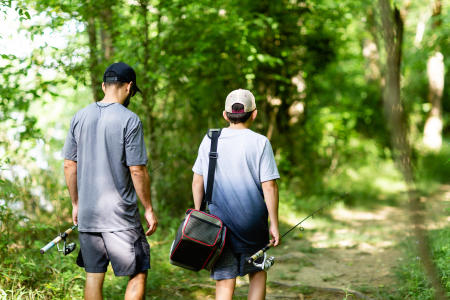
- Pack it in, pack it out. Place all trash in garbage bags and carry it home. Food scraps, cigarette butts and other litter can take years to decompose and are unhealthy for wildlife.
- If adventuring with pets, plan to pack out their waste as well.
- When camping in remote areas, have a plan to dispose of human waste properly.
PRINCIPLE NO. 4
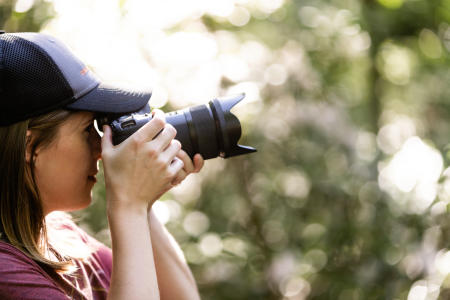 LEAVE IT AS YOU FIND IT
LEAVE IT AS YOU FIND IT
- North Carolina is home to amazing diversity of indigenous plants and animals. Snap a picture instead of picking flowers, gathering shells and collecting pinecones.
- Leave rocks as you find them to protect critters’ sensitive habitats, prevent erosion and avert other ecological impacts.
- Forgo carving into trees, which inflicts lasting damage and can kill the vegetation.
- Adhere to laws that prohibit the removal of natural objects from national parks and other protected places.
PRINCIPLE NO. 5
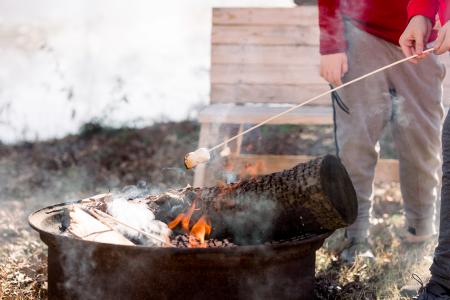 BE CAREFUL WITH FIRE
BE CAREFUL WITH FIRE
- If you choose to have a fire, check on regulations, secure a permit if needed and keep the fire small. If allowed, gather wood from the ground instead of breaking branches from trees. Buy firewood locally to avoid bringing in invasive species.
- Burn all wood to ash. Before leaving, check that the fire is completely out and ashes are cold.
- On overnight camping trips, use a stove for cooking.
PRINCIPLE NO. 6
KEEP WILDLIFE WILD
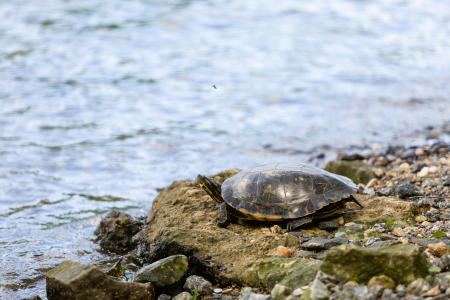 From black bears and wild horses to salamanders and birds, all wildlife should be treated with respect in the natural areas you are visiting.
From black bears and wild horses to salamanders and birds, all wildlife should be treated with respect in the natural areas you are visiting.- Observe creatures from a distance. Getting too close causes undue stress and harm.
- Refrain from feeding wild animals. It alters their natural behavior and puts them and you at risk.
- When camping, store food securely. Keep garbage and food scraps out of the reach of wildlife.
PRINCIPLE NO. 7
BE CONSIDERATE OF OTHERS AND SHARE THE OUTDOORS
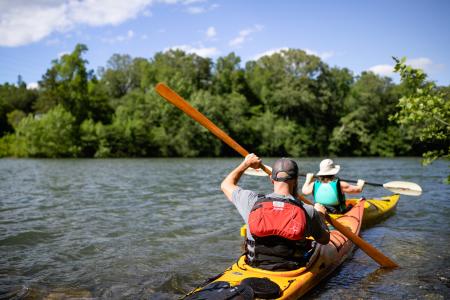 People have a range of skill levels and different ideas about how to enjoy the outdoors. Respect others so that North Carolina’s natural spaces will be welcoming and relaxing for all.
People have a range of skill levels and different ideas about how to enjoy the outdoors. Respect others so that North Carolina’s natural spaces will be welcoming and relaxing for all.- Be mindful of your noise level so that others can listen to nature.
- Honor the rule of thumb that those traveling downhill will yield to those travelling uphill.
- Be considerate when passing others on the trail. Politely announce your presence and proceed with caution.
©Leave No Trace Center for Outdoor Ethics
Want to Learn More?
How you can get involved:
Tarp Clean Up Awareness Week: April 4-9
Tarp Awareness Week reminds residents to reduce roadside litter and increase safety by using tarps to secure waste loads in open vehicles.
“Using a tarp helps prevent the unsightly and unhealthy accumulation of trash along our roadsides,” said Ariel Kanupp, Catawba County Waste Reduction Coordinator/Educator. “Even the smallest amount of trash blown from a moving vehicle adds up. In North Carolina, it costs taxpayers millions of dollars to clean up roadside trash every year.”
Tarp Awareness Week is a community-wide environmental education awareness program created by Keep Catawba County Beautiful, Republic Services and Catawba County Utilities & Engineering. For more information, contact Ariel Kanupp at (828) 465-8217.
North Carolina Litter Sweep: April 16-30
Traditionally scheduled for the last two weeks of April and September, Litter Sweep is the N.C. Department of Transportation’s biannual statewide roadside litter removal initiative. Residents throughout the state participate in local efforts to help clean up North Carolina's roadways.
In addition to volunteers, NCDOT maintenance crews devote one week of their time to picking up litter and collecting orange bags placed on the roadsides by volunteer pickups.
Volunteers are provided cleanup supplies, such as reversible orange/blue trash bags, gloves, and orange safety vests, from their local NCDOT County Maintenance Yard office.



